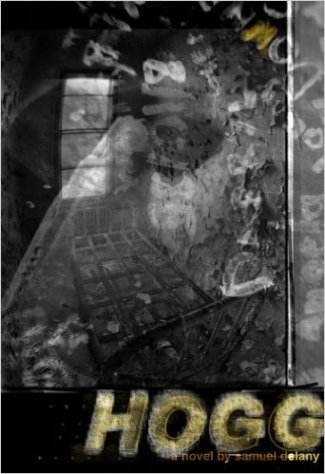 “One trick pony” is usually used in a disparaging way, but really, it depends on how good the trick is. Drugs are a one trick pony, but based on various after school specials I’ve seen, they’re certainly worth doing, and are probably the only thing worth doing.
“One trick pony” is usually used in a disparaging way, but really, it depends on how good the trick is. Drugs are a one trick pony, but based on various after school specials I’ve seen, they’re certainly worth doing, and are probably the only thing worth doing.
Fuan no Tane is the ultimate one trick manga. It’s a barrage of ghost tales and urban legends, 3-4 pages each, with no characters, no stories, and sometimes hardly any text. Like snowflakes, none have much effect on their own, but when they come at you as a blizzard, you soon feel very cold. And addicted. It’s hard to stop reading Fuan no Tane, but I recommend it in only small doses. You can’t exactly marathon this stuff, it’s like too many dances with China White, you overdose at a certain point and your brain shuts down.
If you were raised on urban legends about men with hooks for hands and killer toilet seat spiders, you’ll feel right at home here. Some are brutal and gory, with “The Ear-Slashing Monk” being the most memorable in this category. Others have a strong element of camp. Still others bypass camp completely, and enter a Daliesque world of postmodern absurdism. “The Eyes that Seek”, for example, involves an army of detached eyeballs rolling down the highway.
Japanese humor notoriously inaccessible to Westerners. I don’t know if these ghost stories are Japanese in origin, or if Nakayama has adapted western material, but the terror impulse is probably far more universal than laughter. A lot of these are definitely creepy – although some of the cartoony ones do take the edge off the proceedings a little. It’s a great formula from a quality assurance standpoint, too. It doesn’t matter that some of the chapters fall flat, because there’s another one straight away to take the taste away.
Nakayama followed this up with Fuan no Tane Plus (aka, More of the Same™), and more recently Kouishu Radio, (aka, More of the Same™: The Samening, Electric Boogaloo). I think this might be the only trick he’s capable of.
None of which matters to an addict, of course.
No Comments »
 Britney Spears once had a husband. Not the legendary “marriage annulled in 55 hours” husband. A different husband. The degrees of inconsequence are already piling up, but let’s press on.
Britney Spears once had a husband. Not the legendary “marriage annulled in 55 hours” husband. A different husband. The degrees of inconsequence are already piling up, but let’s press on.
For a few months Kevin Federline was reasonable tabloid fodder, and he decided to use his fame as Mr Britney Spears to launch a career as a rapper. This was his big break. Failure was not an option. As Vanilla Ice once put it, “opportunity comes once in a lifetime, yo.”
The results were a purported Brazilian ass-shaker called “Popozao”, part of an unfinished track with lyrics inveighing against “all the Pavarottis followin’ me” over a backdrop of fart samples, and a studio album called Playing with Fire, which was described by the press as a concept album dedicated to spending Britney Spears’ fortune. With the ink drying on divorce papers, and his career plummeting so hard it never got off the ground in the first place, Kevin embarked on a tour to promote the album. I have a friend who’s worked as a sound man for rappers. He says you’ve got to give them a wireless mic, because they keep making 180 turns in the same direction while walking on stage and if there’s an XLR cable it ends up kinked and twisted. But I go off course. Just like rappers with a mic cable.
Tickets to his shows weren’t selling, so management started giving them away for free. They were prepared to lose money just so they could have full houses. Was it worth it?
Some people view fame as a luck-based enterprise, like gambling. In some ways, it’s even worse than that, because unlike gambling, the past effects the present. A roulette wheel doesn’t care if you struck out the last fifty times, the 51st will still be an honest spin. But if an entertainer has his name attached to a notorious flop, future opportunities can dry up. You just can’t afford to be known as a guy who’s stuff fails. In show business, you’re only as good as your last hit.
So yeah, his label was reasonable in deciding throw money in a furnace so that The Artist Formerly Known as Mr Britney Spears didn’t have to play to an empty house. And he wasn’t the first, or even an especially notable case. K-Fed was merely a lowly white-belt in the ancient dojo of Paying to Avoid Looking Like A Failure.
Remember KISS? As the 70s wound down, and KISS was oversaturated to the point of being uncool, they pulled off a stunt where each member released a solo album on the same day. They actually pressed and shipped a million copies of each to record stores, so they’d be certified platinum (the RIAA’s gold, platinum, and diamond certs are based off albums shipped, not albums sold. You could theoretically go platinum and sell zero albums.)
Unfortunately, nobody really wanted to hear Gene Simmons’ cover of “When You Wish Upon a Star” or thirty minutes “will this do?” from Peter Criss. Very few of these solo albums were sold, and their record company Casablanca took a body blow to the tune of millions of dollars. But they got their platinum records. Score! History recorded KISS as paper champions, even though they got battered and bloodied for all twelve rounds in the marketplace.
Other examples of large scale “fake it till you make it” include:
1. Potemkin Villages
2. WWE promoters pumping “canned heat” through the PA at quiet events (ie, pre-recorded cheering and booing noises). Any attempt at charisma and stage presence becomes obsolete, as you can make anyone look like a hero or a villain.
3. Qatar trying to pump up hype for their nonexistent soccer prospects by building stadiums and filling them with hapless Nepalese slaves, who dutifully pretend to be cheering fans.
The fakery can be a bit overwhelming to keep track of. Sometimes you wonder if anyone honestly represents themselves in any venture.
No Comments »
 This book fetishises ugliness, in both senses of the word “fetish”. It fixates upon it, and also elevates it to the level of a talisman made of vomit and putrescence. Hogg doesn’t do softness, it does rot. It doesn’t do hardness, it does blood-stained tire irons and blood-engorged extremities. It doesn’t do dryness, except for hard industrial sheet metal that scrapes your knees during oral sex. It doesn’t do wetness, it does blood, spit, mucus, and bodily fluids. Stephen King once said that being hangover gives you an uncanny ability to zero in on only the ugliest things in your surroundings. If so, Hogg‘s having the worst morning after in history. And it’s written by a legendary science fiction author.
This book fetishises ugliness, in both senses of the word “fetish”. It fixates upon it, and also elevates it to the level of a talisman made of vomit and putrescence. Hogg doesn’t do softness, it does rot. It doesn’t do hardness, it does blood-stained tire irons and blood-engorged extremities. It doesn’t do dryness, except for hard industrial sheet metal that scrapes your knees during oral sex. It doesn’t do wetness, it does blood, spit, mucus, and bodily fluids. Stephen King once said that being hangover gives you an uncanny ability to zero in on only the ugliest things in your surroundings. If so, Hogg‘s having the worst morning after in history. And it’s written by a legendary science fiction author.
It’s an eternal complaint: the Dear Reader betrayed. David Gemmell once described buying Michael Moorcock book, expecting gallivanting adventures with dragons and wizards, and getting a dragonless yarn about a black transvestite. He said that established writers should only write what their readers have come to expect, and all experimentation should be reserved for pen names.
Whether or not you agree, Hogg is probably Exhibit A in the prosecution’s case. I’ve never heard of someone playing against type like this, before or since. Delany’s a watchword for erudite, dense science fiction, but this is a book full of scatological atrocities. You can almost see publishers’ wilting away from revealing the author. On my edition’s cover, the words “a novel by Samuel R Delany” are printed in type so small they’re almost invisible (rendering the book an authorless curiosity that sprang forth fully formed from Sade’s third eye, or something).
The story’s pretty incidental: a young man falls in with a rough crowd and gets sodomised, violated, et cetera. Sometimes it’s been marketed as gay erotica, though there’s nothing erotic about it. The date feels like it falls somewhere in the 60s or 70s. It also feels timeless, and also placeless – where are we, exactly? Hard to say. Urban hellholes become rural hellholes. At some point we end up along the coast, and like Edgar Allen Poe found the sea’s a pretty big hellhole in its own right.
Hogg‘s a bit like the fourth story in Hubert Selby’s Last Exit to Brooklyn, mixed with whatever Jack Kerouac “wandering around raising a ruckus” story you like the best. It has some influences from older transgressive lit, and is probably old enough that it could be considered an influence to many others.
Or maybe not. The book was written in 1969, a time when stories could conceivably be censored for obscenity and public harm (and their authors sent to prison). It was a trunk novel for decades, before finally seeing publication in 1995. A shame. Hogg really belongs as part of the 1960s counterculture. It likely would have harmed Delany’s credibility among the sci fi literati (such as it was), but again, that’s what pen names are for. Let rumors circulate for years about who wrote that godawful Hogg abomination.
Besides…trying to push the boundaries of good taste in the fucking nineties? That’s like trying to make it big with rap metal in 2004. What’s shocking for the 60s isn’t so shocking next to Stokoe’s “Cows”, Aldapuerta’s The Eyes, and Palahniuk’s “Guts” (to pull three examples out of my ass). Hogg has to beat off some stiff competition, fnarr fnarr, and it comes out looking rather limp. Hogg wants to be the bleeding edge. It ends up being more of a historical curiosity, a book that can only be written about using the past tense.
No Comments »
 “One trick pony” is usually used in a disparaging way, but really, it depends on how good the trick is. Drugs are a one trick pony, but based on various after school specials I’ve seen, they’re certainly worth doing, and are probably the only thing worth doing.
“One trick pony” is usually used in a disparaging way, but really, it depends on how good the trick is. Drugs are a one trick pony, but based on various after school specials I’ve seen, they’re certainly worth doing, and are probably the only thing worth doing.

